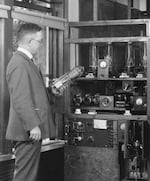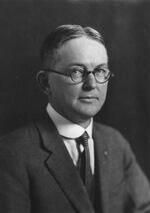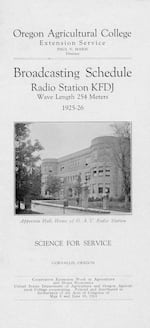On Jan. 23, 1923, radio station KFDJ made its first formal broadcast — marking the beginning of a new era in public media.
It began as the work of Oregon Agricultural College physics instructor Jacob Jordan and his homemade fifty-watt transmitter.

An OAC physics professor built the first radio transmitter for KFDJ.
OSU Special Collections & Archives Research Center
Today we know OAC as Oregon State University. Like the university, KFDJ would grow and change in countless ways over the years.
As a land grant college, OAC’s mission included providing education and services to the community through an extension service. In the early 1920s, radio seemed like an exciting new way to do that via the airwaves. But first, someone would need to figure out how to do it.
Related: Watch: "Oregon Experience: Oregon State University"
According to the OSU document “The Development of Radio Station KOAC in the Department of Physics,” students and ex-Navy radio operators returning from World War I wanted instruction in the emerging wireless technology field.
As a new instructor in the physics department, Jordan ultimately built the program from the ground up.
“— The Development of Radio Station KOAC in the Department of Physics, circa 1960sMr. Jordan had at that time great interest, and considerable experience, in amateur radio.”
With few resources, Jordan put together a wireless station in the physics laboratory on the third floor of Apperson Hall.

Oregon Agricultural College's physics instructor Jacob Jordan built KFDJ radio's first transmitter. In 1925, as an assistant professor, he designed and built a more powerful transmitter, and the call letters were changed to KOAC.
OSU Special Collections & Archives Research Center
The school didn’t dedicate much money for the necessary technology, and supply problems made equipment hard to come by. So Jordan gathered what items he could and built most of the project himself.
Eventually, he succeeded in cobbling together a low-watt transmitter.
In 1922, an OAC football game served as the subject for the first test transmission. The transmission proved successful, and OAC officially applied to operate the new transmitter over the public airwaves. The U.S. Department of Commerce granted the license that December.

On January 25th, 1923, the OAC cadet band broadcast a concert on new radio station KFDJ.
OSU Special Collections & Archives Reseach Center
Just a month later, in January 1923, early radio listeners tuned in to KFDJ’s debut broadcast featuring the Corvallis High School band. That broadcast marked the birth of what we know today as OPB.
Station KFDJ continued to broadcast sporadically during the following school year. At first, there was no set schedule. If listeners happened to catch one of the broadcasts, they might hear live music, phonograph records, or staff members lecturing or just expounding on a favorite subject.
An early radio program brochure explained that the radio station aimed to “extend the benefits of this institution into the thousands of homes of the state … without cost.”

KFDJ Broadcast Schedule, 1925-26
OSU Special Collections & Archives Research Center
